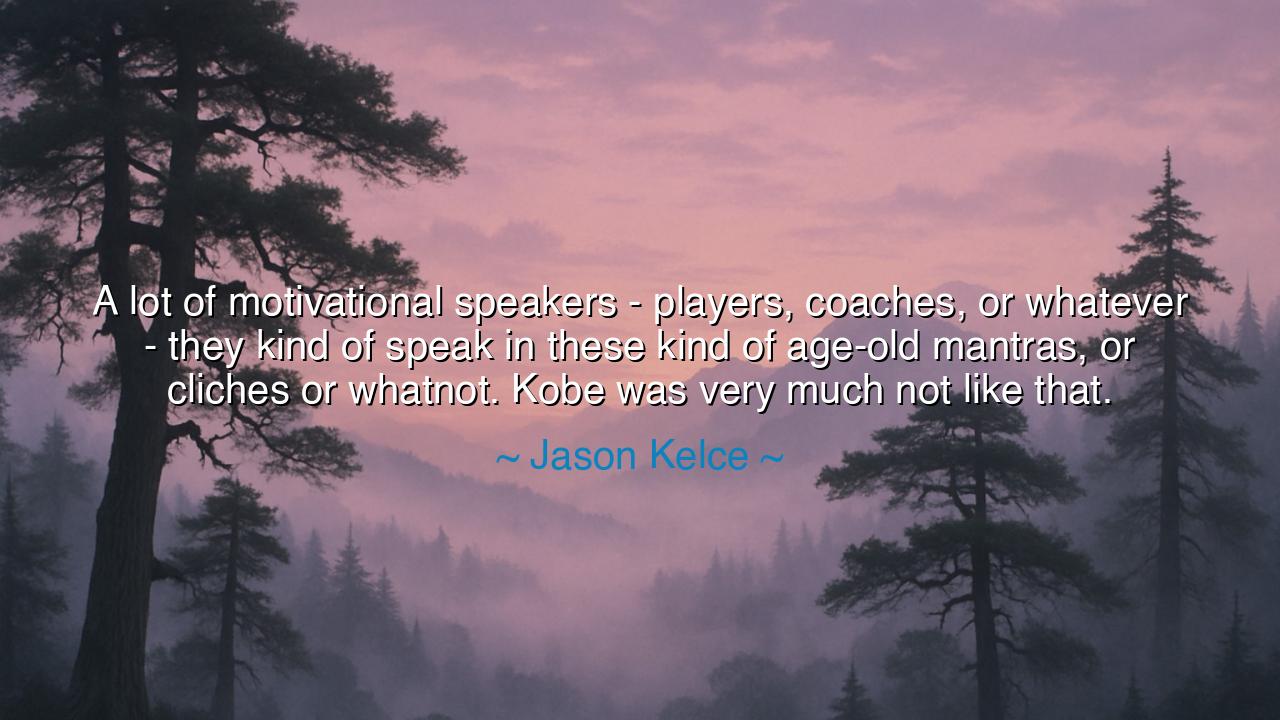
A lot of motivational speakers - players, coaches, or whatever -
A lot of motivational speakers - players, coaches, or whatever - they kind of speak in these kind of age-old mantras, or cliches or whatnot. Kobe was very much not like that.






In the words of Jason Kelce, warrior of the gridiron and student of character, we hear a tribute to authenticity: “A lot of motivational speakers—players, coaches, or whatever—they kind of speak in these kind of age-old mantras, or clichés or whatnot. Kobe was very much not like that.” This is no casual reflection, but a recognition of a rare truth—that words alone are nothing if they are hollow, and that true inspiration arises not from repetition of the old, but from the living fire of experience and conviction.
The origin of this insight lies in the contrast between borrowed phrases and genuine wisdom. Many who seek to inspire fall back upon sayings long worn smooth by use, mantras passed from age to age until they lose their sharpness. Such words may sound noble, but they no longer cut the heart. Kelce, in remembering Kobe Bryant, reminds us that greatness speaks differently. Kobe did not merely echo clichés—he spoke from the furnace of his own labor, his own sacrifice, his own relentless pursuit of excellence. His words carried weight because they were not empty; they were lived.
Consider the life of Kobe himself, whose philosophy came to be known as the “Mamba Mentality.” It was not a string of polished slogans, but a way of being—discipline, obsession, resilience. When he spoke, he spoke of waking at dawn to train, of pushing through injury, of refusing to accept limits. His words pierced because they were inseparable from his deeds. Here lies the heart of Kelce’s praise: that Kobe’s voice was not the voice of a mere motivational speaker, but of a man who had already proven his creed in battle.
The ancients too warned of the difference between empty speech and living truth. Socrates chastised the sophists of Athens for weaving clever words without substance, charging money to dress ignorance in fine rhetoric. Yet Socrates himself, who owned no riches and sought no fame, inspired his students by asking them to examine their lives, to live authentically, to turn philosophy into flesh. Just as Jason Kelce admired Kobe for rejecting hollow mantras, so too the ancients revered those whose words were born of lived reality rather than of performance.
The meaning of Kelce’s words is thus both a warning and a tribute. He warns us not to mistake noise for wisdom, nor slogans for guidance. And he pays tribute to Kobe, whose influence arose not from polished speeches but from a life that embodied its own lesson. True greatness, he reminds us, does not hide behind clichés. It speaks with the raw honesty of one who has walked the path, felt the pain, borne the scars, and still chosen to rise.
The lesson for us is clear: if you wish to inspire others, do not merely repeat what has been said before. Instead, live so deeply and so faithfully to your values that your very life becomes the message. Speak only what you have proven with your actions, and your words will strike like arrows of truth. As Kobe showed, authenticity is the greatest power—far greater than rehearsed eloquence or familiar slogans.
Practical counsel is this: reflect on your own struggles, victories, and lessons. When the time comes to guide others, do not borrow words you have not lived. Share instead what you know in your bones, what you have earned through sweat, failure, and persistence. In doing so, you will speak as Kobe spoke—not in clichés, but in truths that cut through doubt and awaken strength.
Thus, Jason Kelce’s tribute resounds as an ancient reminder: true inspiration is not in the polish of phrases but in the power of authenticity. A thousand voices may repeat the same mantras, but one voice, spoken from the depths of lived experience, will outshine them all. Be that voice. Live so boldly that your words carry the weight of your deeds, and like Kobe, you will inspire generations not with slogans, but with truth.






AAdministratorAdministrator
Welcome, honored guests. Please leave a comment, we will respond soon